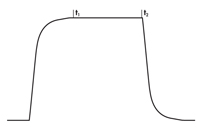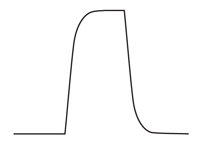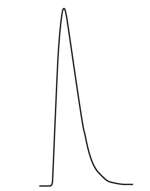There are two kinds of Continuous-Flow Analysis
1) Segmented-Flow Analysis (SFA)
The reaction stream is segmented with bubbles of air or nitrogen to reduce inter-sample dispersion.
2) Flow Injection Analysis (FIA)
There are no air bubbles in the reaction stream. The dispersion in the system is used to mix the samples and reagents.
SEAL Analytical continuous-flow analyzers use SFA technology because the bubbles bring important advantages to routine analysis.
Advantages include:
Complete reaction
If a time delay is necessary, the reaction stream can be delayed or heated. Because SFA can automate longer, hotter reactions, it allows slow reactions to proceed to completion as shown in the diagram.
Two factors contribute to sensitivity
- Complete reaction between reagents and sample
- Measuring the final reaction mixture at maximum concentration
The advantages of a complete reaction
- Sensitivity is the maximum possible.
- Small variations in reaction conditions such as changes in flow rate or temperature do not affect method sensitivity.
- When the method sensitivity remains constant, results stay within specification for a longer period
- Recalibration is not needed as often
Sample concentration in the detector reaches a constant, maximum value (Steady State)
The output from a SFA system is a peak with a flat plateau. The plateau represents a constant, steady state value in the flowcell, at maximum concentration. The sample result is calculated from the peak height, which is averaged from readings on the plateau.
In contrast, the sample peak from a FIA system only reaches maximum concentration for an instant.
The steady state SFA peaks maximize sensitivity in two ways
- The sample concentration in the flowcell reaches its maximum value, undiluted by wash or carrier solution.
- Maximum concentration is maintained for long enough to obtain an accurate reading.

Detector signal from a sample measured for a long time. Between t1 and t2 the concentration in the flowcell is constant.

Sample peak from a normal SFA analysis. The sampling time is long enough to allow several seconds steady state at maximum concentration.

Sample peak from a normal FIA analysis.